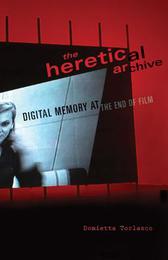
|
The Heretical Archive: Digital Memory at the End of Film
Paperback / softback
Main Details
| Title |
The Heretical Archive: Digital Memory at the End of Film
|
| Authors and Contributors |
By (author) Domietta Torlasco
|
| Physical Properties |
| Format:Paperback / softback | | Pages:160 | | Dimensions(mm): Height 216,Width 140 |
|
| Category/Genre | The arts - general issues
Electronic, holographic and video art
Literary theory |
|---|
| ISBN/Barcode |
9780816681105
|
| Classifications | Dewey:777 791.4301 |
|---|
| Audience | |
|---|
|
Publishing Details |
| Publisher |
University of Minnesota Press
|
| Imprint |
University of Minnesota Press
|
| Publication Date |
5 March 2013 |
| Publication Country |
United States
|
Description
The Heretical Archive examines the relationship between memory and creation in contemporary artworks that use digital technology while appropriating film materials. Domietta Torlasco argues that these digital films and multimedia installations radically transform our memory of cinema and our understanding of the archive. Indeed, such works define a notion of archiving not as passive preservation but as the creative rearticulation of cinema's perceptual and political textures.
Author Biography
Domietta Torlasco is associate professor of French and Italian and comparative literary studies at Northwestern University. She is the creator of the digital film Antigone's Noir and the author of The Time of the Crime: Phenomenology, Psychoanalysis, Italian Film.
Reviews"Inspired by other scholars who have brought the phenomenological method to cinema, Domietta Torlasco writes beautifully of her own encounters with films and images, drawing the reader into her own vision as she elucidates its implication in a constellation of deep thought. The book's insights are as fresh and profound as its writing, in other words: at its best moments, it is a real tour de force that is an extended reflection rather than a series of discrete observations." -Amy Villarejo, author of Film Studies: The Basics "Digital technology allows once quiescent cinemagoers to dismantle and refashion previously inviolable products of the film industry. Torlasco sees the potential for politically transformative thinking in such acts. She argues that our capacity to imagine alternative futures may depend on our ability to reconfigure the virtual archive of filmic memory. Part philosophical reflection, part manifesto, Torlasco's book is essential reading for anyone wishing to steer a critical theory of audiovisual art between the Scylla and Charybdis of technophilia and artworldspeak. " -Victor Burgin, author of The Remembered Film
|